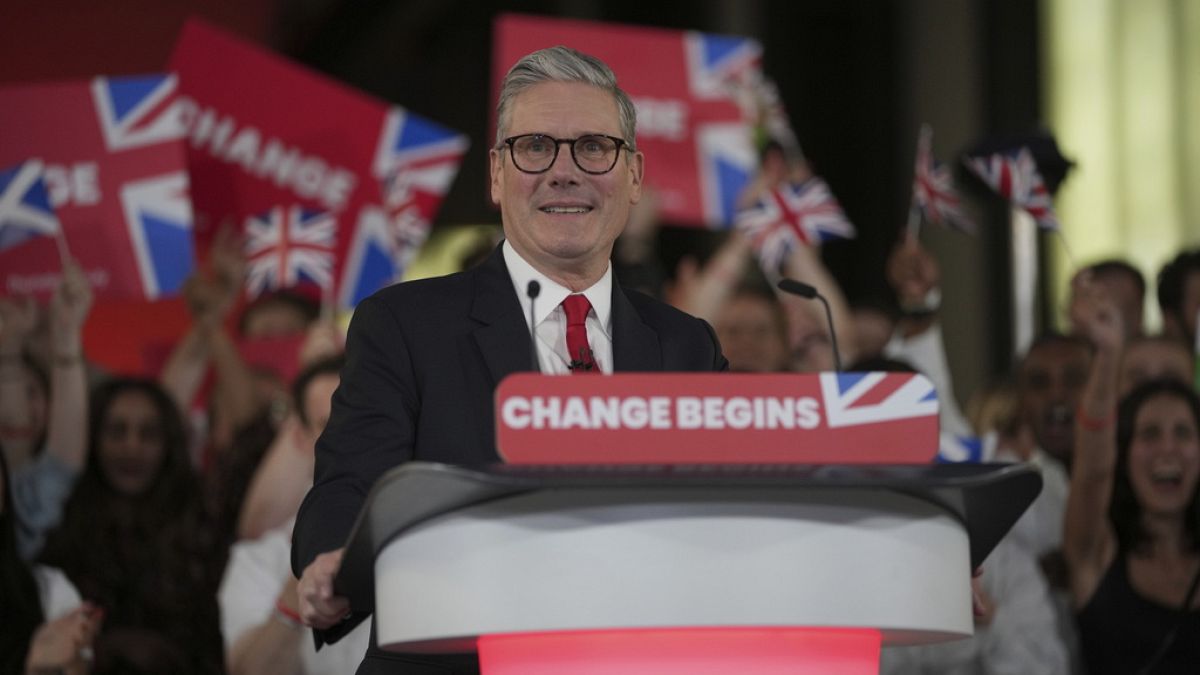In the next 24 hours new ministers will be appointed and the direction of the new government will be made clearer.
“Change begins now,” the UK’s new prime minister, 61-year-old Sir Keir Starmer, promised supporters as dawn broke in London on Friday.
With only two seats yet to be decided in the 650-seat House of Commons, Labour has won a thumping majority of 412 seats after gaining 211 seats.
The right wing Conservative party of the former government now has only 121 seats – a 250 seat loss – and the centrist Liberal Democrat party has 71, a 63 seat gain.
The outgoing prime minister Rishi Sunak told supporters in his Richmond constituency – where he was re-elected as an MP – that he would shoulder the burden of his party’s historic loss.
Sunak then returned 10 Downing Street, which since 1735 acted as both the home and the office of British prime ministers. Of all the world’s political addresses, only the White House in the US is probably more famous.
In his final speech as Prime Minister, Sunak said he was honoured to lead the “best country in the world” and he said the British people had “delivered a sobering verdict”.
He then visited Buckingham Palace where he formally offered his resignation to King Charles III – an historic formality as, whilst the king is the head of state, he has no real power in the UK’s political processes.
Even so, the king still holds weekly meetings with the prime minister to discuss government matters. While the monarch is politically neutral, he still has right to “advise and warn” the prime minister if he believes it’s necessary.
In a long-held tradition, the then monarch asked Starmer to form a new government.
And shortly afterwards Starmer entered 10 Downing street for the first time to begin assembling his new government.
The king will return to the public stage later this month for the state opening of Parliament. After this, in a joint meeting of House of Lords and the House of Commons, he will deliver a speech written for him by the incoming government to lay out its legislative programme.
‘National renewal’
Starmer said his political ambitions for the next five years would centre on putting the “country first, party second” and that the government would focus on “national renewal”.
“We have to return politics to public service,” he said.
The Labour Manifesto, a document outlining the party’s policy priorities, lists five goals for the political group. This includes kickstarting economic growth; advancing clean energy; reducing violent crime; reforming education; and improving and investing in the ailing National Health Service.
For the first time in 14 years the Labour Party can set the political agenda – but it and Starmer face huge challenges. The former barrister and Director of Public Prosecutions is up against a nation impatient for change, amid a backdrop of gloomy economic conditions, mounting distrust in state institutions and a fraying social fabric.
Labour’s Rachel Reeves, set to become the UK’s first female finance minister, said she is under “no illusions” about the scale of the challenge she will face. “The severity of the inheritance from the Conservatives is truly awful,” she told journalists.
Reeves noted that the UK’s debt burden is running at 100 per cent of the country’s national income and the tax burden at a seven-decade high. She said she “can’t promise to turn everything around straight away,” but the driving mission of an incoming Labour government will be to kickstart economic growth.
Despite this, Anand Menon, professor of European Politics and Foreign Affairs at King’s College London, said British voters should be reassured by the new government’s relative stability.
Voters should be buoyed, she said, “with ministers staying in power for quite a long time, and with government being able to think beyond the very short term to medium-term objectives,” he said.
The first day of the parliament is scheduled to commence on Tuesday, July 9, with the business being the election of the Speaker. The State Opening of Parliament and the King’s Speech will follow on Wednesday, July 17.
Read the full article here
